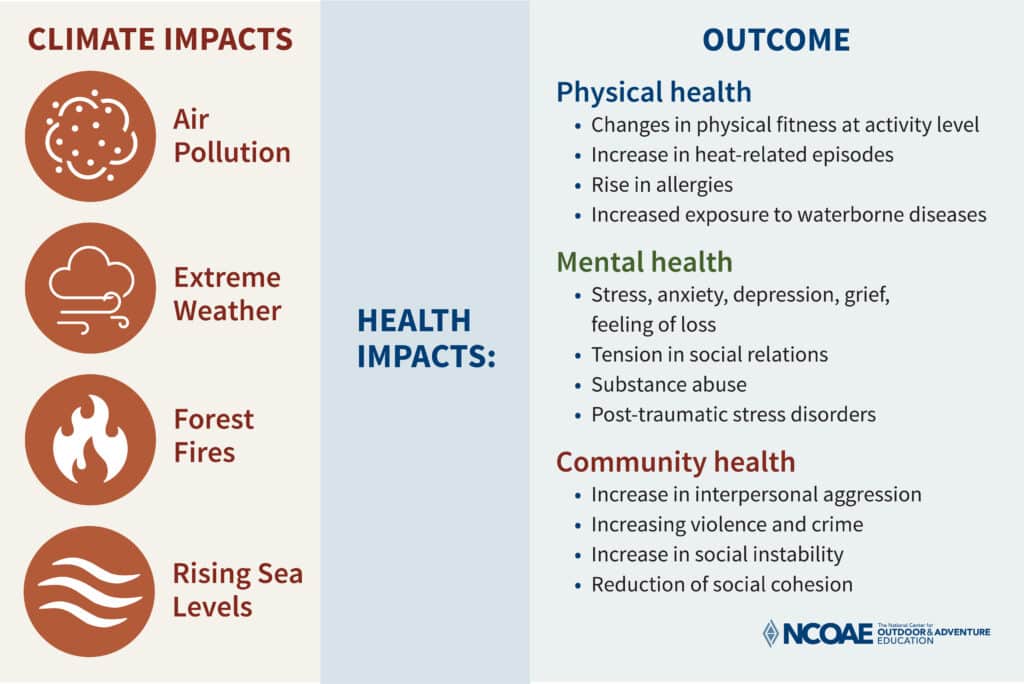As you’ve probably heard or read, last month was the hottest June our planet has ever experienced — topping a prior record set in 2019. In fact, according to the European Union’s Copernicus Climate Change Service, the nine hottest Junes ever occurred over the past nine years.
In addition, extreme heat creates crispy conditions, and last month’s torrid temps were all the kindling needed to promote the one of the worst wildfire season in Canadian and North American history. Add to that a record-breaking cyclone in southeast Africa, heatwaves across Asia, and extreme flooding throughout the world. Oh, and this just in: June sea ice levels in Antarctic were at their lowest level since scientists began keeping records.
All of this highlights what many of us have sensed and now know for certain: Climate change is upon us — and that’s a scary situation for those of us who work in the outdoor industry. The cumulative effect of all of these climate catastrophes has created what the American Psychology Association (APA) calls “eco-anxiety.”
According to the American Psychology Association, eco-anxiety is “the chronic fear of environmental cataclysm that comes from observing the seemingly irrevocable impact of climate change, and the associated concern for one’s future and that of next generations.”
Media coverage adds to the angst
This fear is evident across our land, with hand-painted yard signs and a variety of bumper stickers on vehicles, all advocating that “Science is Real.” Newspaper editorials push for “immediate action,” or ask, “Are We Too Late?” Such articles often crowd out other headlines and newscast bulletins, which only increases our angst.
These conversations about our planet’s future — most of them based on science — have had an effect on most everyone’s emotional state. Words have weight, words plant ideas. And ideas spread faster than anything else, for good or bad.

Some people pay attention, some don’t notice, and some dismiss the science out of hand, pushing the notion aside without realizing they are being affected at a cellular level by the emotions that are under the surface. This is what is happening, and sometimes we see it, sometimes we miss it, but in the end we’re all going to feel it personally, or collectively.
Is being fearful of an environmental future a warranted emotion? Spend some time in the outdoors talking with people who have spent their lives interacting with nature. Listen to farmers, wildlife resource officers, rangers, and then answer the question.
What do we do? Maybe instead of just talking about it, we change our frame for conversations, and act. For example, in our recent blog post With Increased Participation Comes a Renewed Focus on Stewardship, we addresses the need for stewardship planning — policies and guidelines that directly figure into the stewardship of the backcountry areas in which we run our programs.
Take your fears to the trail
Here at The National Center for Outdoor & Adventure Education (NCOAE), we use our theory of change (found in our Educational Framework) to frame conversations as well as create outcomes for when we return from the backcountry. The conversations we have in wild places make us feel good, surround us with positive energy, and they yield actionable results.
NCOAE’s directors and field instructors are not therapists. We don’t provide therapeutic programming. However, our clients do tell us they feel better after a stint in the backcountry, and below are some of the reasons why:
- There is limited access to phones, newspapers and broadcasts in the wilderness, thus relieving a state of constant media overload
- Our campers experience deep conversations during evening Summit, guided by our instructors (See our course manual for description)
- Gain sense of purpose
- Explore realistic lifestyle changes
- Learn patience and understanding with themselves and others
- Connect with nature
- Feel part of a new community when they finish a course
Eco-anxiety is real. It is being fed to all of us, and people are eating it up. And it can have a serious and damaging impact on our sense of health and well-being. Can a backpacking trip to the nearby mountains be the solution to Eco-anxiety? Probably not. But responding to a call to action can.
17 Goals to Transform Our World
The United Nations’ Sustainable Development Goals has established what it calls “17 Goals to Transform Our World,” and it urges all countries to promote prosperity while protecting the planet. The UN recognizes that ending poverty must go hand-in-hand with approaches that build economic growth and address a range of social needs including education, health, social protection, and job opportunities — all the while tackling climate change and environmental protection.
Meanwhile, step off the trail, embrace your pristine surroundings and take a deep breath. Let it out slowly. Repeat.
– – – – – – – –
About the Author: Stephen Mullaney is the Director of School Partnerships at The National Center for Outdoor & Adventure Education (NCOAE). He has worked domestically and internationally with schools, organizations and wilderness programs. His classrooms have ranged from dilapidated trailers at overcrowded, underfunded schools to the Himalayan mountains and everything imaginable in between. His past students include gang members/prisoners, education majors, college and university professors, and pioneers in the field of outdoor and adventure-based experiential education. Stephen’s philosophy is to focus on the development of positive working and learning environments. He brings more than a quarter of a century of education experience and understanding of human nature to any organization, whether it is an education institution or a private company. His writing has appeared in adventure sports/education journals, magazines and on the web. Stephen prefers to arrive by bicycle and sit in the dirt.
TALK TO US
Have any further questions about our courses, what you’ll learn, or what else to expect? Contact us, we’re here to help!
Leave a comment